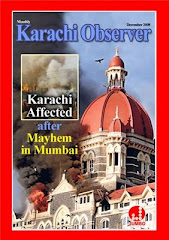
By Syed Shoaib Hasan
BBC News, Karachi
"We are doing our best to prevent them from taking over," says Mohammad Rafiq earnestly as he sits in the crowded room in Karachi.
He is referring to Taleban militants who have come to the city from Pakistan's tribal areas such as North and South Waziristan who "want to take over Karachi".
Rafiq, a primary school teacher, is a resident of Baldia town, a suburb of Karachi.
He is also a member of a neighbourhood, or sector, office of the MQM (United National Movement) political party for his area.
'Bully and kill'
Karachi, on the coast of Pakistan's southern Sindh province, is the country's largest city.
It is also the South Asian nation's financial capital and main port.
The MQM, which is allied to Pakistan's ruling Pakistan People's Party (PPP), is politically in control of Karachi.
The party draws its strength from a mainly middle class electorate, made up of Urdu-speaking people, descendants of migrants from India after partition in 1947.
Its detractors have often complained that it has used its political strength to bully and even kill opponents.
The MQM, however, strongly denies this allegations.
"Our job is to find solutions for neighbourhood problems at the local level," says Farooq Sattar, a central government minister and senior MQM leader.
"We also inform the top leadership if there are matters here that are beyond our control."
Of late these have been primarily to do with what the MQM has called the "Talebanisation" of Karachi.
It says that more and more people are migrating to Karachi from different parts of Pakistan, especially from the tribal areas.
"The Taleban don't want to be concentrated in the northern areas and are looking for other options," says Dr Sattar.
De facto rulers
Urban experts agree, pointing out that there has also been a substantial rise in migrants into Karachi from the North West Frontier Province's Pashtun community.
It is perhaps this fact which is most galling for the MQM, which stormed into control of Karachi following ethnic riots which began in the mid-1980s.
At that time, disagreements over the identity question led to clashes between the Urdu-speaking and Pashtun-speaking communities.
The MQM rose to power on the back of these riots which left hundreds of people dead and established the party's position in Karachi.
But critics have accused the party of using the "ethnic card" to keep control over Karachi.
Ethnicity remains a touchy topic in the metropolis and since 2007 there have been rumblings of a return to the problems of before.
In November, more than 40 people were killed in two days of ethnic-related killings.
"Riots and violence did take place between 1985 and 1988, but our leaders met and reached a conclusive peace accord," says Aminullah Khattak, secretary general of the Sindh chapter of the mostly Pashtun Awami National Party (ANP).
"We wanted to end it, and it did end at that time."
'Menial activities'
But Mr Khattak now says that the issue has once again reared its head, this times he feels because of economic factors.
"The thing that has started it again is that the Pashtuns living over here have progressed economically," he says.
"Some people believe that they will remain watchmen or labourers, or remain engaged in menial economic activities all their lives.
"But they've become well educated, they've progressed economically, they want to get better jobs."
The ANP argues that "Talebanisation" is not a problem in Karachi, but just a ruse for a movement against upwardly-mobile Pashtuns.
Evidence of that movement is all too clear to Azmatullah Khan, a pharmacy student, as he stands on the ruins of his family business which was burnt to the ground in December.
"Four armed men came to the back of the market on two bikes," he says.
"They threw some kind of chemicals... and started a fire which spread if water was thrown on it.
"You can see yourselves, they only targeted Pashtun businesses," he says while bitterly pointing to nearby timber shops which remain intact and open.
"If you look at the situation in Karachi now, it is the Pashtun community which is facing the brunt of the problems," says Ismail Khan, a member of the ANP provincial executive committee.
"Pashtun areas are the least developed in terms of basic amenities, as well as facilities such as hospitals and schools.
"In addition, Pashtuns are said to be the root of all troubles."
'Taleban ideas'
Ismail Khan believes that the MQM is behind this, and its principal motive is to get Pashtuns to give up the land they hold in Karachi.
There has been a substantial rise in migrant numbers
"We are the only threat to their power, and that is why they have used the spectre of Talebanisation."
But Mohammad Rafiq and many others believe that it is the realities on the ground which have forced the MQM to move matters.
"We had no problems with the Pashtun community which has been settled here for a long time," he says.
"But we do have a problem with those who are extremists and have come here to spread Taleban ideas."
There seems little outward signs that the fundamentalist movement is taking over this most cosmopolitan of cities.
Karachi's problems remain largely ethnic despite claims by the MQM.
Pakistan's current debilitating security scenario however means that this is no less of a threat.
"Karachi remains Pakistan's jugular vein and its microcosm," says Aminullah Khattak.
"Any descent into violence here could cripple the country economically, and have grave consequences for national unity."























